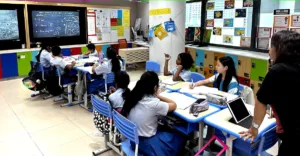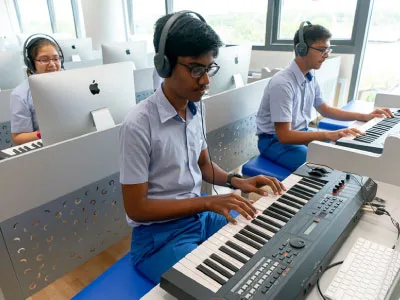Living in today’s digital world, it is undeniable that screens have become an integral part of our daily lives, and they often serve as a means to engage with the world around us.
However, deciding how much screen time is appropriate for your child can be a challenge.
Considering that screens are likely to be a prominent aspect of your child’s future, it is important to guide them in using technology efficiently and safely. By acknowledging the role screens play in our modern lives and providing guidance on responsible screen use, we can equip children with the necessary tools to navigate the digital landscape effectively while maintaining a balanced lifestyle.
For younger children – toddlers and preschoolers – screen time should be limited to ensure their healthy development. Excessive screen time at this age can hinder important cognitive, social and physical development.
As children enter elementary school, screen time can play a more prominent role in their education. With the increasing integration of technology in schools, students may need to spend more time on screens for educational purposes. Nevertheless, it is important to regulate the content they are exposed to, ensuring that it is age-appropriate and aligns with their educational goals.
Here are 11 strategies to reduce screen time for children:
- Set clear boundaries: Establish clear rules about when, where, and which screens are acceptable. Create a schedule that works for your family’s needs and preferences. Discuss the appropriate duration and specific times when screen time is allowed. Try to engage your children in the process of setting boundaries to make them feel involved and heard.
- Discuss the rules: Determine the reasons behind reducing screen time, such as promoting outdoor play, encouraging imaginative games, or improving mood and behaviour. Discuss the reasons behind the rules, such as the importance of physical activity, face-to-face interaction, and the need for quality sleep.
- Befriend technology to maximise benefits: Use technology to your advantage by setting timers or scheduling device usage. Allow devices to turn off automatically after a designated time.
- Reduce your own screen time: Be a role model for your children by minimising your own screen time when they are present. Encourage reading and engaging activities instead.
- Spend time with your children: Spend quality time playing with your children, as this can divert their attention away from screens while strengthening your bond with them.
- Encourage physical activities: Provide alternative activities that are more appealing, such as sports, board games, art projects, or other hobbies your children enjoy.
- Foster independence: Teach your children to engage in autonomous play, allowing them to entertain themselves. In fact, it’s okay to let your child be bored for a period of time – it may just spur their creativity and get them to do some interesting activity that they would not normally explore otherwise.
- No devices before bedtime: Establish a consistent routine that avoids screen time before bedtime, and remove devices from children’s bedrooms to promote better sleep.
- Consistency is key: Stick to the predetermined screen time limits for each age group. Avoid using screens as rewards or punishments.
- Screen time should neither be a reward or punishment: Avoid assigning too much importance to screen time by linking it to rewards or punishments. Teach moderation and other coping mechanisms.
- Invite their friends over more often: Encourage social interaction and physical play by inviting friends over. This can reduce the reliance on screens and promote healthier relationships.
Also read: Digital safety and well-being: 5 ways to navigate through the online world
As a top international school in Singapore, GIIS’ tech-enhanced campuses with digitised classrooms and skill-based studios provide engaging and interactive learning experiences to our students. Use of devices is focussed towards enhancing the educational goals through age-appropriate exposure to technology with guidance from teachers on digital well-being. By engaging in extracurricular and co-curricular activities, like sports, arts and more, students at GIIS are nurtured to become well-rounded individuals.
If you are keen to know more about GIIS, please don’t hesitate to contact our admissions counsellors.

































